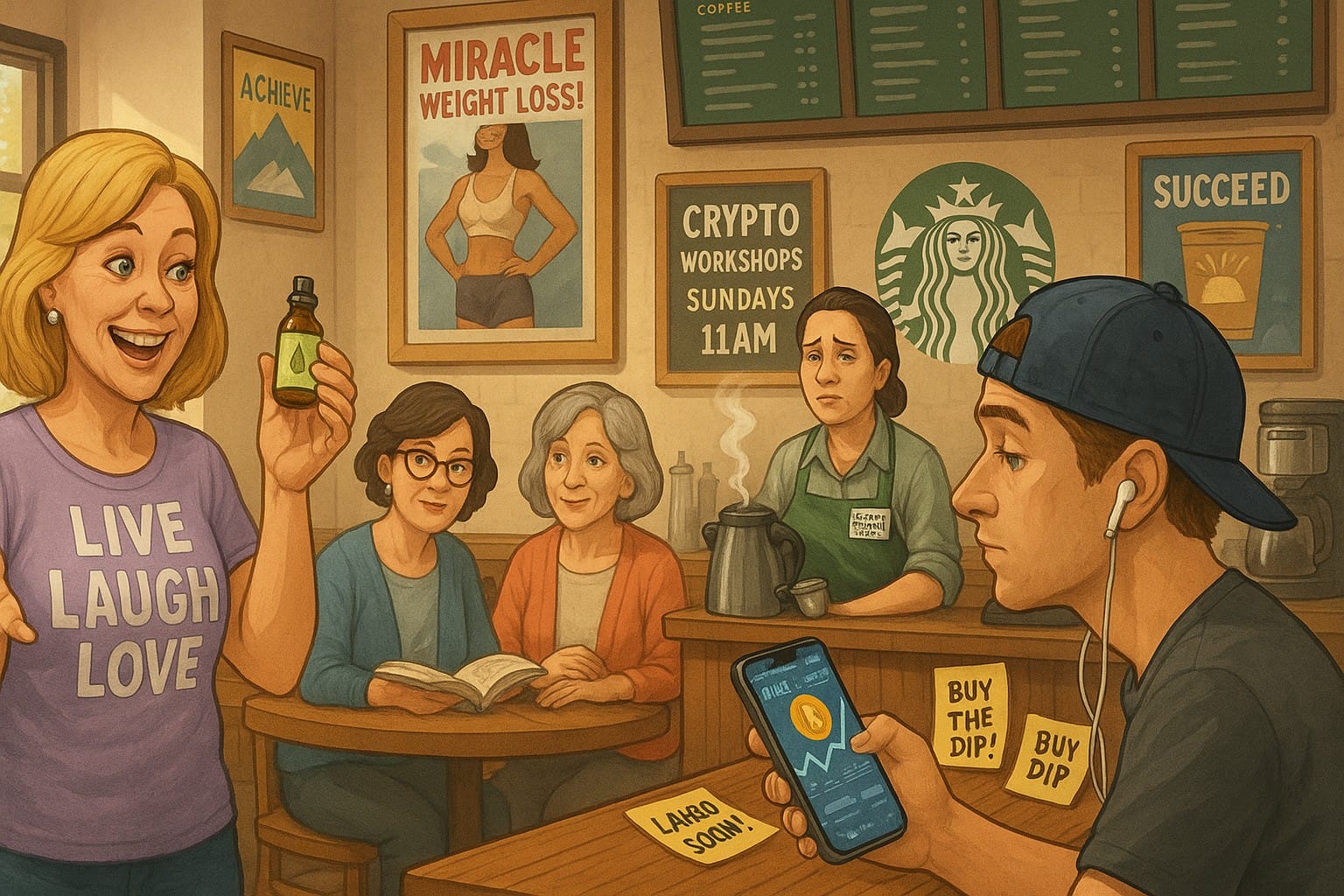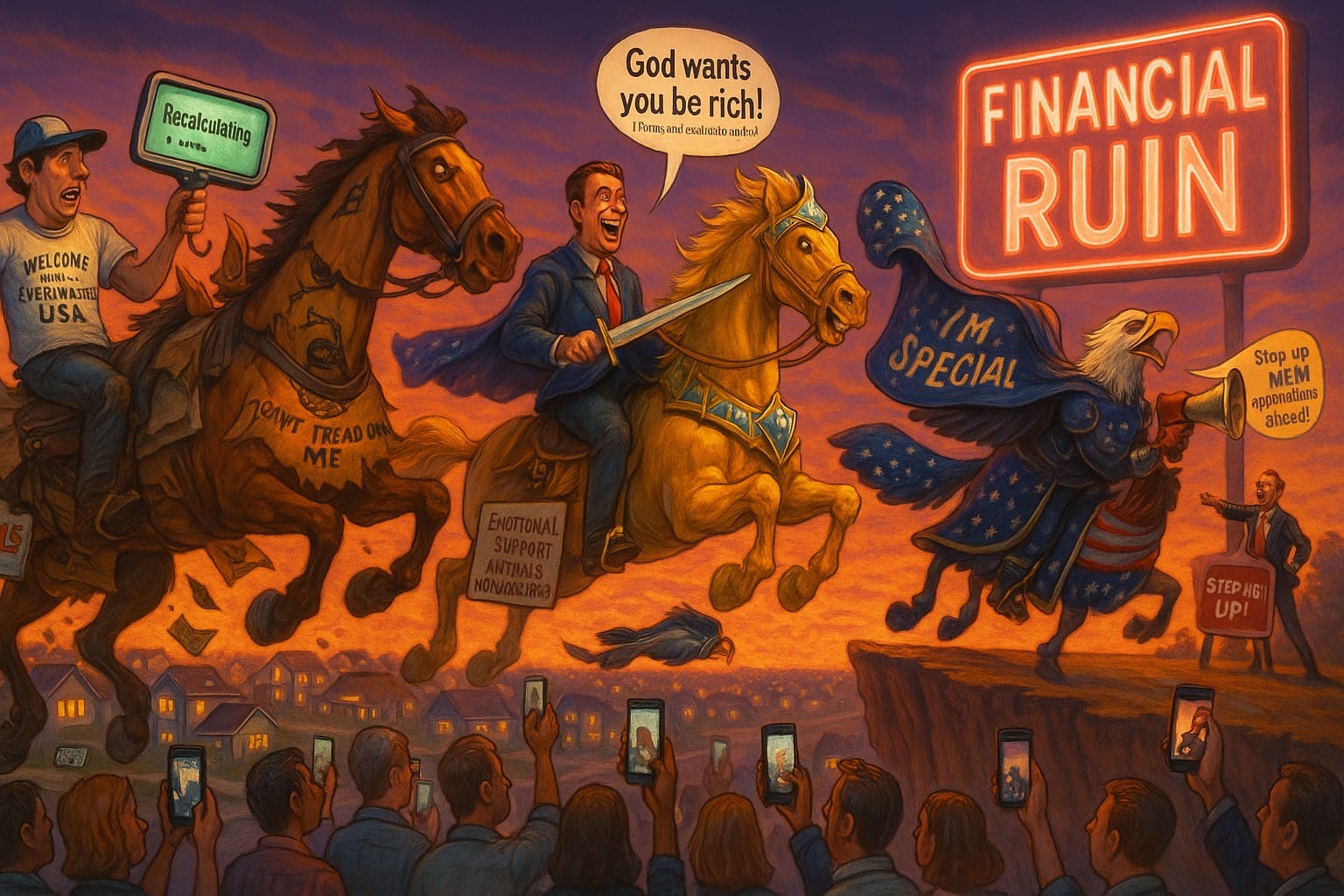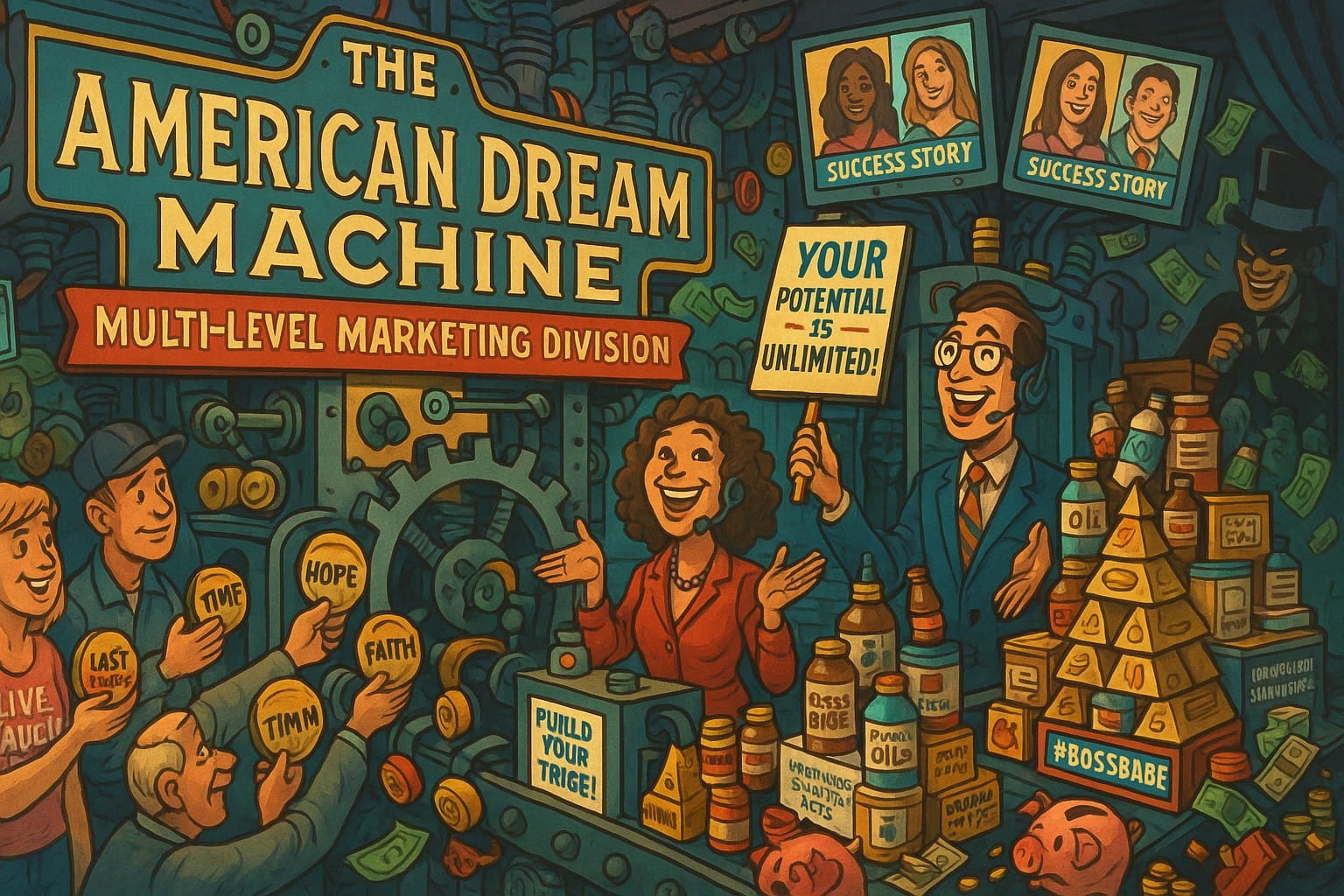
Scene opens: A suburban Starbucks. Karen adjusts her "Live, Laugh, Love" t-shirt while explaining to her book club how essential oils cured her existential dread.
Across the room, Chad scrolls through cryptocurrency forums, convinced he's just one TikTok tip away from financial freedom. Meanwhile, the barista—who has a PhD in sociology—dies a little inside as she steams oat milk.
Welcome to America, where optimism meets exploitation in a beautiful, tragic dance that would make Shakespeare weep into his artisanal coffee.
Here's a question that'll keep you up at night: Why does the country that put humans on the moon keep putting its life savings into pyramid schemes? Why does the nation that invented the internet keep falling for email scams that would embarrass a Victorian-era snake oil salesman?
Spoiler alert: It's not stupidity. It's something far more interesting—and far more American.
The American Dream, Now with Extra Gullibility
Let's start with an uncomfortable truth that would make any Fourth of July barbecue spectacularly awkward: The same cultural DNA that makes America great also makes Americans the world's most enthusiastic marks.
Think about it—this is a nation built by people who looked at an untamed wilderness and thought, "You know what? This seems like a reasonable place to start over." That kind of optimistic risk-taking has served them brilliantly. It's also why your American aunt keeps falling for Facebook ads promising miracle weight loss through "one weird trick."
Americans have been so thoroughly marinated in "anyone can make it big" sauce that they've developed what researchers call "pathological optimism." They're the golden retriever of nations—eternally convinced that this time will be different, tail wagging furiously as they chase the next shiny opportunity.
(Fun fact: Americans are 300% more likely than Europeans to believe in "get rich quick" schemes. They're also the only developed nation where "entrepreneur" and "unemployed" have become synonymous, but that's a whole different tragedy.)
Now here's the delicious irony that'll make you snort-laugh into your morning coffee: A country founded by religious separatists, gold rush dreamers, and people who thought sailing into the unknown was a sensible career move somehow produced a population that's shocked—SHOCKED—when strangers on the internet lie to them about cryptocurrency.
But here's where watching America gets genuinely fascinating. This isn't just some quirky cultural habit—it's a perfect storm of psychological vulnerabilities converging like a sociological disaster movie, and understanding how Americans got here? Well, it's the first step toward probably not fixing it, but at least enjoying the spectacle from a safe distance.
The Four Horsemen of American Gullibility
So let me break down the anatomy of American gullibility for you, because it's more systematic than you might think. Picture four psychological forces working together like a well-oiled machine designed to separate Americans from their money and common sense.
1. The Mobility Trap (Or: Why Nobody Knows You're a Dog)
Americans move every 4.1 years on average. That's roughly the lifespan of a hamster and about the same amount of time it takes to build meaningful community connections. When you're constantly starting from scratch, you're essentially walking around with a neon sign that says, "I HAVE NO SOCIAL SUPPORT SYSTEM AND CRAVE BELONGING.”
This nomadic lifestyle creates what I like to call the "airport terminal effect"—people surround you, but everyone's a stranger heading somewhere else. It's like living in a perpetual state of social vulnerability, which turns out to be perfect hunting grounds for anyone selling belonging with a side of financial ruin.
Cue the multi-level marketing schemes, prosperity gospel churches, and political cults that promise instant community for the low, low price of your critical thinking skills.
Here's a research nugget that'll ruin your day: Countries with stable, tight-knit communities have scam rates 60% lower than the US. Apparently, having neighbours who know your real name is surprisingly effective fraud prevention. Who would have thought social bonds could be better than antivirus software?
2. Rugged Individualism: The Remix
Now take that social atomization and combine it with Americans' national obsession with pulling themselves up by their bootstraps, and you've got a recipe for disaster that would make Gordon Ramsay weep into his beef wellington.
They've weaponized self-reliance into self-destruction with impressive efficiency. Americans would rather give their social security number to a "prince" in Nigeria than admit they need help navigating modern life. It's like they've convinced themselves that asking for assistance is weakness, but trusting strangers with financial advice is... entrepreneurship?
This creates what sociologists call "isolated vulnerability"—people who are both too proud to seek genuine help and too lonely to reject false offers of salvation. It's like watching someone drown while refusing the life buoy because they insist on swimming to shore alone. Noble? Maybe. Effective? Well...
(Side note: Countries with robust social safety nets don't have entire industries built around selling hope to desperate people. Funny how that works.)
3. The Protestant Work Ethic Gone Rogue
But wait—it gets even more beautifully twisted when you factor in America's spiritual baggage. This is where things get chef's kiss magnificently absurd, and frankly, where the American experiment starts looking like a psychological case study.
See, Calvinism taught Americans that worldly success equals divine favour. Fast-forward 400 years through the theological telephone game, and they've created a culture where being broke means you're morally deficient, but any get-rich-quick scheme must be God's way of testing your faith.
It's theological cognitive dissonance with a capitalism chaser, and it goes down smooth until you're explaining to your spouse why you invested the college fund in "blessed crypto" because the pastor's nephew said Jesus wanted you to be financially free.
4. American Exceptionalism: The Ultimate MLM
And here's the crown jewel of American delusion—they've convinced an entire nation that the basic rules of reality don't apply to them. Not gravity, not economics, not the fundamental laws of "if it sounds too good to be true, it probably is."
Other countries look at obvious scams and think, "That's fraudulent." Americans look at the same scams and think, "But what if I'm the exception?" It's like watching an entire country play the lottery while genuinely believing they've figured out a system.
Newsflash: They're not the exception. No one is. That's literally what makes it a scam.
This toxic cocktail of mobility, individualism, prosperity theology, and exceptionalism create the perfect storm of gullibility. And before you start thinking I'm being unfairly harsh about American character, well... cracks knuckles ...let's talk numbers, shall we?

The Numbers Don't Lie (But Americans Wish They Would)
Time for some data, because nothing says "reality check" like cold, hard statistics that make you question an entire nation's decision-making process:
- Americans lost a record $12.5 billion to consumer fraud in 2024—enough to buy Luxembourg a really nice vacation home, but still just a fraction of the real total, since most fraud goes unreported.
- 73% of Americans say hard work is very important for getting ahead—adorable, really, like believing in the tooth fairy, but with more student loans and fewer quarters under the pillow.
- The U.S. is a world leader in both entrepreneurial spirit and bankruptcy filings—the American Dream: shoot for the stars, occasionally file Chapter 7 on the way down.
- MLM participation in the U.S. is higher than in Europe—about 20 million Americans vs. 14 million Europeans—not quite five times, but still enough to keep those “boss babe” mugs flying off the shelves.
- About 24% of Americans have no emergency savings at all, but only 14% have dabbled in cryptocurrency—because what’s financial security without a little digital gambling on the side?
Here's the kicker that'll make your brain do a little somersault: The same optimistic naïveté that makes Americans vulnerable to scams also drives their innovation, risk-taking, and legitimate success stories. They're essentially playing Russian roulette with the American Dream, except sometimes the chamber's empty and sometimes it's loaded with essential oils and cryptocurrency promises.
Which brings us to perhaps the most fascinating—and slightly terrifying—aspect of this whole mess: Today's charlatans haven't invented anything new. They've repackaged the same old snake oil for the Instagram age, and honestly? The efficiency is breathtaking.
The Modern Manifestation: Same Scam, New Phone
Today's charlatans have updated their playbooks for the digital age with surgical precision. Instead of travelling medicine shows, they've got Instagram influencers selling "lifestyle brands." Instead of tent revival meetings, they host cryptocurrency conferences in Miami with more production value than a Marvel movie. Instead of door-to-door encyclopedia salesmen, they've evolved into LinkedIn "coaches" promising six-figure incomes through "passive income streams."
The medium shifts, technology progresses, but the message stays as timeless as Canadian optimism itself: "You're special, you deserve more, and I have the secret."
And if you want to see American gullibility distilled to its purest form—like raw, concentrated vulnerability in a bottle—you need look no further than the multi-level marketing industry.
It's as if someone took every American psychological weakness we've discussed and turned it into a business model.
The MLM Perfect Storm
Multi-level marketing deserves special recognition as the most perfectly American scam ever devised. It's like someone took every vulnerability in the American psyche and wrapped it in inspirational quotes and emoji-heavy Facebook posts with the precision of a Swiss watchmaker.
Think about the genius of it: MLMs package exploitation as empowerment ("You're not buying overpriced vitamins, Karen—you're becoming a #BossBabe entrepreneur!"), target social isolation ("Build your tribe!"), and weaponize optimism ("Your potential is unlimited!").
Got mobility problems? MLMs promise instant community. Caught in the individualism trap? They sell you the fantasy of being your own boss. Steeped in prosperity gospel? Success equals righteousness: failure equals insufficient faith in the products. Drunk on exceptionalism? You're definitely going to be in that magical top 1% who make money.
It's social engineering so sophisticated it would make Machiavelli weep with admiration—and probably ask for the business model so he could franchise it across Renaissance Italy.
The Tragedy
And here's the thing that'll keep you staring at the ceiling at 3 AM, questioning everything about American society and human nature in general: They'll probably never learn.
Because admitting they're suckers would mean accepting the system isn't perfect, and that's more un-American than universal healthcare and paid family leave combined. Other countries watch this unfold like concerned friends witnessing someone repeatedly date obvious sociopaths: "We're worried about you, America. This pattern isn't healthy."
But Americans can't seem to hear the intervention over the sound of their own exceptionalism and the gentle whoosh of another Nigerian prince's email landing in their inbox, promising to share his vast fortune with someone pure of heart and light of wallet.
So, what's the grand takeaway from this beautiful disaster of American psychology? Well, buckle up, because the answer is simultaneously obvious and downright depressing, like most truths about human nature.

The Bottom Line (That No One Wants to Read)
The same cultural forces that make America innovative, entrepreneurial, and genuinely dynamic also make Americans the world's easiest marks. They've created a society where healthy skepticism gets labelled as pessimism, social support gets dismissed as weakness, and every stranger with a business card might be their ticket to financial freedom.
It's not a bug in the American system—it's a feature. And features, as any good American entrepreneur will tell you, can always be monetized.
So, the next time you witness an American neighbour excitedly explaining their new "business opportunity" with the fervour of a recent convert, remember this: They're not being stupid. They're being American. And in this land of the free and home of the brave, sometimes there's barely a difference.
Fade out on Karen, still convinced that her essential oils empire will fund her retirement while the American Dream lives on, one lavender-scented delusion at a time.
I don't sell memberships or anything, but if you want to buy me a beer, I won't refuse.


